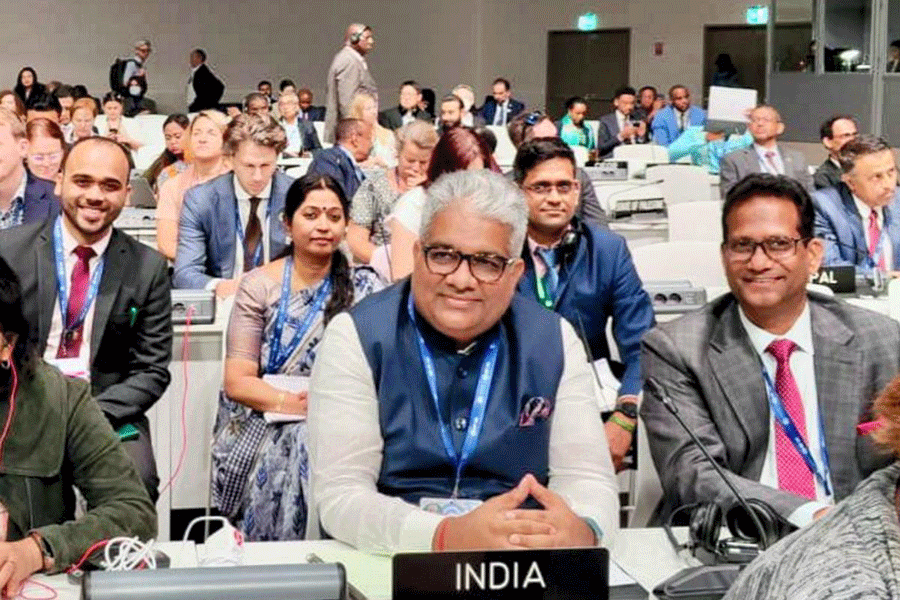The global temperature rise is within striking distance of shattering the 1.5°C mark compared to the pre-industrialised era, a target set by the United Nations in the Paris climate agreement in 2015 to prevent devastating consequences.
This was confirmed by the World Meteorological Organisation (WMO) during the opening day of the Dubai climate conference on Thursday. The pre-industrialised era — 1850-1900 — is considered a benchmark as the human-induced climatic impacts started to soar after this period.
The report released by the WMO also projected that it is virtually certain that 2023 is going to be the “warmest year” ever recorded, underlining the growing impact of climate change on global weather. The report clarified that this is not a one-off occurrence, reminding that “the past nine years, 2015-2023 (being) the nine warmest years on record”.
The report also pointed out that high-intensity cyclones are becoming the new normal and referred to Cyclone Mocha in the Bay of Bengal that recently affected several countries in south Asia, including India as it passed close to the Sunderbans located on the southern fringes of Bengal.
“The global mean near-surface temperature in 2023 (to October) was around 1.40(°C)… above the 1850-1900 average. Based on the data to October, it is virtually certain that 2023 will be the warmest year in the 174-year observational record, surpassing the previous joint warmest years, 2016 at 1.29°C... above the 1850-1900 average and 2020 at (about) 1.27°C,” the report said.
The report mentioned a series of other findings that have highlighted the global warming taking place across the world, and urged global leaders to take urgent climate actions at the Dubai COP28, which would continue for the next two weeks.
“Observed concentrations of the three main greenhouse gases (warming gases) — carbon dioxide, methane and nitrous oxide — reached record high levels in 2022, the latest year for which consolidated global values are available (1984–2022),” the report said. “Ocean heat content reached its highest level in 2022… in the 65-year observational record (and) in 2023, global mean sea level reached a record high in the satellite record… reflecting continued ocean warming as well as the melting of glaciers and ice sheets,” it added.
“Greenhouse gas levels are record high. Global temperatures are record high. Sea level rise is record high. Antarctic sea ice is record low. It’s a deafening cacophony of broken records,” said WMO secretary-general Prof. Petteri Taalas. “We need leaders to fire the starting gun at COP28 on a race to keep the 1.5-degree limit alive,” the official added.
Mrutyunjay Mohapatra, director-general of meteorology at the India Meteorological Department and vice-chair of the WMO, told The Telegraph that "global temperatures are rising everywhere, but in India, north India has registered a rapid surge in mercury compared to the southern parts".
"Temperature rise in the sea surface is triggering sea level rise; besides glaciers or sea ice are melting at a faster pace, and posing a potential threat to all the coastal places across the world, including India," he added.
The report's cyclone section said: “Tropical Cyclone Mocha, in May, was one of the most intense cyclones ever observed in the Bay of Bengal, reaching peak 10-minute sustained winds of 115kt.… Cyclone Mocha triggered 1.7 million displacements across the sub-region from Sri Lanka to Myanmar and through India and Bangladesh.”
"The latest WMO report serves as a grim harbinger, highlighting the irreversible damage inflicted on our glaciers, sea levels, and the very essence of our global climate system. This warning is one we cannot afford to overlook, as the urgency for action resonates now louder than ever,” said Harjeet Singh, head of global political strategy at Climate Action Network International.
"It is indisputable that wealthier nations, bearing historical responsibility, must lead the way in decisively shifting from their reliance on fossil fuels and also have a crucial role in providing financial support to vulnerable nations,” Singh added.










